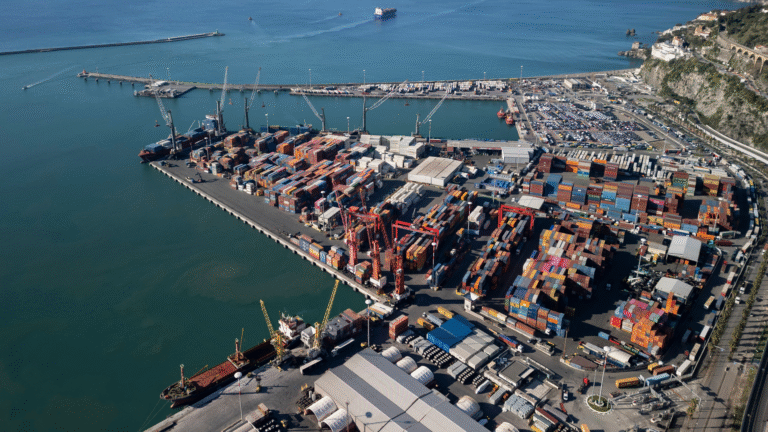
Written by Jeffrey J. Tafel, CAE,
President of National Association of Foreign-Trade Zones (NAFTZ)
Is FTZ Right for Me?
If you’re importing or exporting at scale in the United States, the U.S. Foreign-Trade Zones (FTZ) Program is one of the most powerful – and most overlooked – tools available. It lets companies import, store, assemble, and manufacture goods in designated U.S. zones before those goods formally enter U.S. commerce, simplifying customs, deferring or reducing duties, and improving the economics of keeping production and distribution in the United States.
That does not mean a U.S. FTZ is automatically a good fit. Whether it works for you depends on operational, financial, compliance, and strategic factors – and a “yes” on most of them can still become a “no” if a few key details do not line up.
What an U.S. FTZ can do for a Trade-Involved Business
In broad terms, U.S. FTZ participation delivers:
- Efficiency – streamlined customs and logistics through reduced paperwork, consolidated entries, and faster clearance, including potential savings from weekly entry filing.
- Financial flexibility – duty and tariff deferral until goods leave the FTZ and enter U.S. commerce, potential inverted-tariff benefits where finished-good duty rates are lower than component rates, and duty relief on export-bound product.
- Global competitiveness – lower landed costs and smoother cash flow that help U.S.-based operations compete more effectively at home and abroad.
Those benefits are real and proven. The harder question is whether they are material enough – for your volumes, duty profile, product mix, and systems – to justify the investment.
Signals That FTZ Might Be Worth a Closer Look
Common “green flags” include:
- Chronic pressure on cash and working capital, where deferring duties until goods sell would be meaningful.
- Significant U.S. manufacturing or kitting, particularly where finished-good duty rates are lower than component rates.
- Large, steady import volumes with frequent entries and internal processing costs.
- Distribution or e-commerce hubs that hold inventory for multiple markets, including exports.
If you recognize several of those dynamics in your own network, FTZ is probably not just a curiosity; it is a serious strategic option.
Why There Is No Simple Checklist Answer
Two operations with similar duty spend and volumes can reach opposite conclusions because of differences in facility locations, system capabilities and data quality, product mix, export share, and corporate risk tolerance. Any of these can be a deal-killer or a deal-maker.
You cannot get to a sound “yes” or “no” from a brochure, a webinar, or this article alone. You need someone who is experienced in the U.S. FTZ program to model your flows, duty profile, and operational reality – and to be candid if the numbers or structure do not work.
Why an Experienced FTZ Advisor Is Essential
Because FTZ decisions hinge on interlocking legal, operational, and financial variables, most successful implementations start with a structured feasibility analysis led by an experienced FTZ consultant, working with the local grantee and your internal teams.
A seasoned advisor will quantify potential savings (duty deferral, inverted tariff, weekly entry, duty elimination on exports), test your data and systems against CBP expectations, flag structural or legal barriers early, and map application, activation, and CBP engagement so the timeline and effort are transparent.
You can find experienced FTZ professionals, FTZ products and other FTZ services on NAFTZ’s FTZ Marketplace: https://members.naftz.org/serviceproviderspublic
Where to Start
For companies exploring the program, the National Association of Foreign-Trade Zones (NAFTZ) maintains resources to help you move from curiosity to informed decision, including:
- Top Considerations when Investigating an FTZ webinar recording. This webinar explores the trade protocol process, nuances and approach to determining if FTZs may be a good fit for you. https://register.gotowebinar.com/register/6137296235795393625
- “Is the U.S. Foreign-Trade Zones (FTZ) Program Right For Me?” – a concise overview of key factors such as import/export volumes, manufacturing and distribution profiles, and supply-chain design.
- Fundamentals of FTZs – a seminar that walks companies through benefits, applications, activation, inventory control, compliance expectations, and connects you with experienced FTZ professionals.
- NAFTZ’s FTZ Marketplace – You can find experienced FTZ consultants, FTZ products and other FTZ services on NAFTZ’s FTZ Marketplace: https://members.naftz.org/serviceproviderspublic
The real question is not whether U.S. FTZs work. They clearly do. The question is whether they work for you – at your scale, with your products, in your supply chain. Answering that well is worth doing, carefully, with expert help.
